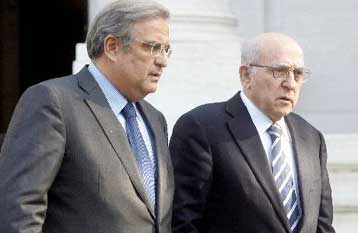
The government decided to increase the fuel and mobile phone taxes, in order to fill the empty state treasury and to lower the deficit.
This will be the topic under discussion of the Ministry Financial Commission this morning, which is expected to approve the first tax increase. The second tax increase will be voted in October.
Taxes will be increased in an attempt to increase the state income and to lower the deficit to 3% of the GDP. The measures will be given to the parliament in a form of a new bill.
Minister of Economy and Finances Yannis Papathanasiou put the government and the parliament in a dilemma: “We will either lower the deficit or we will sink together.” It is calculated that the state budget black hole is ?4 billion.
The worst case scenario of the European Commission for Greece’s economic development is that the 2009 deficit will reach 5.1% of the GDP. When it comes to next year the Commission forecasts that if the finance policy of the country does not change, the deficit will increase to 5.75% of the GDP.
The fuel tax increase will be between 10% and 20%, which means that the price of the unleaded gas will increase with between 5 and 10 cents per liter. The mobile phone taxes will increase with the same percentages and pre-paid mobile phones will increase with 10% over the value of the pre-paid card.
Prices of cigarettes and alcohol will remain the same. But there is an unpleasant surprise for car owners, whose cars are bigger than 2000 cubic meters, because a onetime tax will be imposed. Also, 3.5 million property owners will have to pay two times the Common property tax in three months time.
The government is also trying to increase the VAT income and it will plan a measure in the bill, which will motivate citizens to ask for their receipts. On the other hand, the bonuses of part-time employers in public organizations will be cut.
During next week, 128 000 tax payers with annual income of over ?60 000 will receive a notice from the Tax Services, which will inform them to deposit three two-month payments for “emergent amount,” which will be between ?1000 and ?25 000.